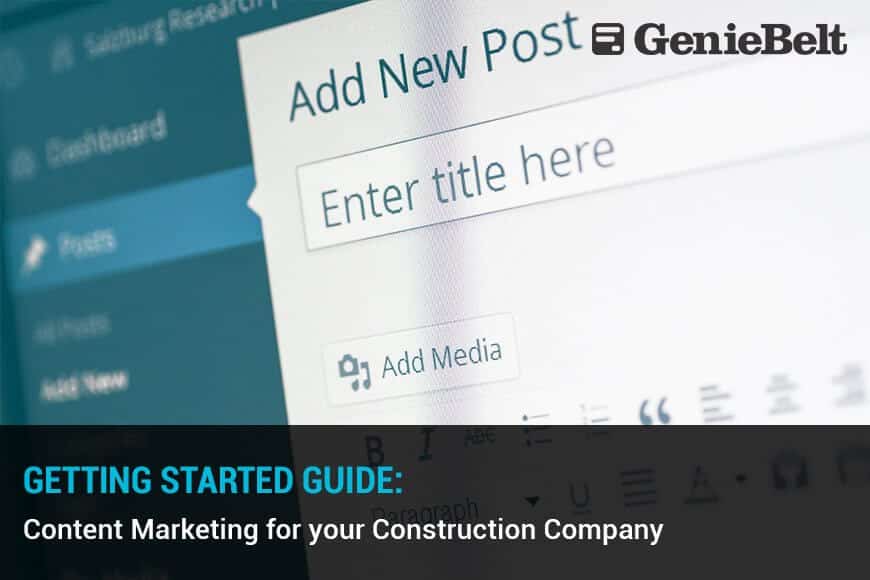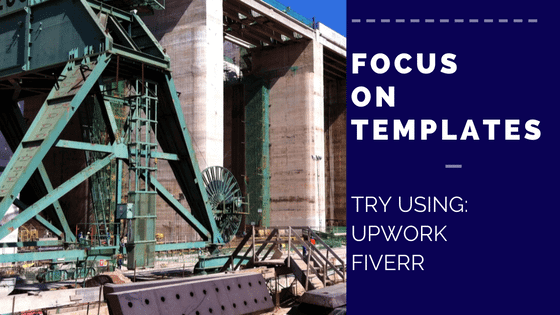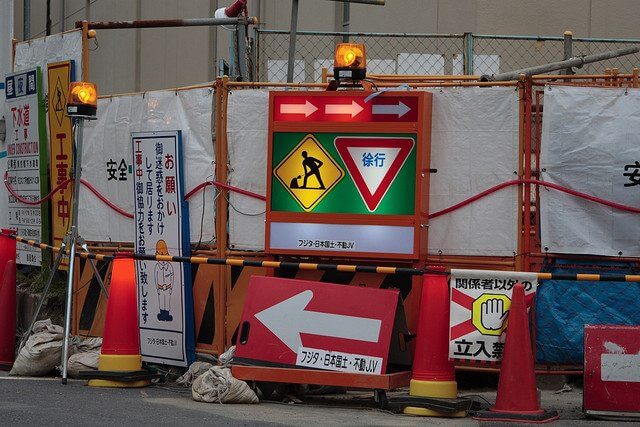Getting Started Guide: Content Marketing for Your Construction Company
Create Content: Why you should content for your construction company

Blogs:
If you’re good enough at your job, you can still give it away some the secrets for free and people will see you as the expert (not as someone that’s just there to make a buck). You need to produce engaging content articles on your blog and popular industry websites in your niche. Content creation is one of the cornerstones of marketing, but it’s not always done right.
Why you should create content?
1). Creates brand awareness
2). Connects you with you your potential customers s
3). Increases organic traffic
4). Boost your search in results rankings
5). Keeps people engaged and helps people understand more about your company
6). Boosts your credibility
What to write?
Think about who your audience is and what they’re likely interested in knowing about you, your industry or your business?
For example: In the construction industry, your audience may be the average homeowner. What are the things they might want to know or could learn about before doing business with you (or just someone like you).
How to find an honest contractor?
Which projects do construction companies make the most money?
How to find out if you’re getting a good deal?
What questions as a consumer should you ask your construction company before signing on the dotted line?
How to spot a construction scam?
How do construction companies estimate projects cost?
Top 5 considerations when remodeling a home
There are so many more articles and ideas that you can come up with on your own that I shouldn’t have to elaborate on here. To find out the most popular articles about a certain topic, use a tool like Buzzsumo.

How should it look
These articles should provide value. If they’re not interesting or valuable, then don’t waste the time to write them. Don’t ever write for sake of writing.
Pictures are important. If you can’t add visuals to your information people will get bored and eventually leave. The pictures should be original otherwise, use free stock images. You can even dress up the content a little more using tools like Canva or PicMonkey. There are hundreds of other tools you can also find in our master list of tools to help you with your business.
Length doesn’t matter so long as the information stays relevant, engaging, and interesting.
Extra tips:
Do:
Pepper in a few links to other blog posts, other websites, and even other publications that are relevant to your blog post. Just make sure that there is a line being drawn with the relevance.
Don’ts:
Don’t steal.
Don’t take writing that isn’t yours. Google is smarter than you.
Don’t steal pictures without giving credit.
Don’t be misleading or lie.
Don’t try to be salesy. People see through it.
eBooks
Ebooks are a longer-form more detailed variety of content that lets you educate your users rather than just briefly entertain.
You should only write an eBook if:
You’re knowledge about the topic
You’re giving away secrets or ways to make money
You’re offering value
Ebooks can be daunting. Make sure to break it up with visuals and try to keep the reader in mind as much as possible. Ebooks, when done correctly get passed around just as much as any content out there. Our new E-book about how to build a solid advertising plan in construction for free is a good example of what we’re talking about.

Templates
Think of what your customers and those in your industry use in tangent with your service and re-create it. There may also be original documents that you’ve created to make things easier for you that you can offer up to others.
If you’re in the construction industry, there are plenty of templates for the end-customer and the industry.
Customer:
Contractor Comparison Template
Work Order Template
Statement of Work Template
Project Timeline Template
Industry:
Residential Construction Invoice Template
Construction Agreement Template
Work Order Template
House measurements template
Job Estimation Template
Proposal Template
These templates can be tricky to make if you’re not familiar with excel or photoshop. Consider using a site like upwork or even fiverr to get the templates created quickly and efficiently.

Checklist
People use checklists for everything these days. In construction, it’s especially important for safety, saving time, and reducing waste. Any time we try to remember a handful of things, it’s always helpful to have a checklist. Again, checklists can be for the industry or end-customer.
Customer:
Contractor comparison checklist
Repair job checklist
Industry:
Material Checklist
Home Depot (hardware store) Run Checklist
Safety checklist
Tools for the job checklist

Customer Case Studies
When you do a great job and the customer is happy, make sure you document that. This is one of the most overlooked things in any business. If people have an overwhelmingly positive experience with a business don’t let those positive feelings fade away. Document them!
Case studies are a narrative that shows a before and after glimpse at how you improved a customer’s life. Obviously there is a difference between B2B and B2C projects, but the same principals apply.
Four types of questions:
About the Project:
Who is it for (this is different depending on whether it’s an individual or company)?
What is it?
Where is it?
Why are they getting the work done?
Life before the service/product:
What caught your attention about _____ company?
How did you start doing business with _______ company?
What had your projects been like before you used _____ company?
Why did you choose ____ company?
Was there a turning point or a moment that you can remember that made you choose us?
Life after the service/product:
How have things improved after you used the service?
What parts of the project came out better than expected?
Would you use _____ company again? Why or Why not?
How have things improved for your business since our work completed?
Are you able to do anything now that couldn’t before?
If you could say one nice thing about our company, what would it be?
Is there anything we could do better in the future?
Quantitative Data:
Improvement Can you quantify any of the changes that have been made?
Are you saving or making more money resulting from of our service?
Pictures:
People are visual and LOVE seeing before and after. Sometimes it’s not always possible to use photos but you should push for this.
Process: Before, During, and After.
Show a gradual process over a few pictures and plenty of pictures of the final polished product. It goes a long way. These pictures highlight your hard work and give others a good impression of your craftsmanship.
Customer Appreciation:
Show the smiling faces of the people you’ve worked for. It’s not hard to ask for a group photo after the work is done. It gives a positive image and puts a human touch to the whole thing. Don’t be afraid to ask.
Format, length, tone, and focus:
Case studyies can be as long or short as you like.
They can as technical as you’re willing to put in the time to create them.
They can take on as much of a casual tone as you like.
Write about the job, client, or the outcome and try not to be too salesy.
Ask for the social shares!
Once you’ve completed the case study and it comes out in either a .pdf, has its own section on your website, or you turn it into a blog post -SHARE IT!
-Social Media
-Blog
-Newsletter
-Future potential clients
Make sure all your customers and future potential customers know about the great job you did and ask your customer to do the same.
Infographics:
Show meaningful data through icons and stats. Infographics have some of the highest number of shares across any channel in social media. Infographics always work best when you have quantitative data but you can also display aspects of a business, process, or idea via visual representation.
Come up with an idea:
Decide what you want to display:
Are you trying to show a trend over time?
Are you showing current tends?
Aspects of a job?
Parts of process?
Examples of great ideas for infographics:
Commercial construction projects in the UK over the last 5 years
Highest paid construction professions in 2016
How to repair a roof
Steps to winning an RFP
Find the data:
It’s often difficult to extract your own data especially when you’re a smaller company. Many companies end up using the research of others to display information about their market and customers rather than trying to do it all themselves. Decide what angle you want to play and begin your research.
Examples of places to look for helpful and FREE data:
Job Data:
http://datatopics.worldbank.org/jobs/
Home Data:
http://www.tradingeconomics.com/united-states/new-home-sales
Cost living / Purchasing / Census:
http://www.bls.gov/
Academia and publishers sometimes find all the information for you, you can search for studies that prove your point and display the data they’ve already collected.
https://www.academia.edu/
Use our case study question cheat sheet for your next case study and our step by step guide on the most efficient marketing techniques in order to become an expert in construction marketing.




